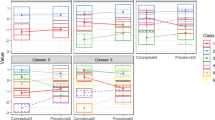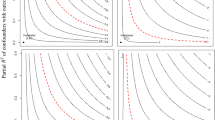Abstract
Conditioned reinforcement for math, or math enjoyment, may be critical for students. If so, this should be established as early as pre-kindergarten, as conditioning the components of math as reinforcement arguably leads to more complex mathematical operations thus impacting individuals’ future math ability and literacy (Engel et al., 2013), A multiple probe across dyads design with a nested multiple probe across dyads design was used to determine if establishing a preference for math influenced students’ rate of learning math. The intervention tested the effect of the individualized reinforcement procedures, based on a sequence of conditioning procedures proposed in Buttigieg and Greer’s (2023) study, on establishing conditioned reinforcement. Three participants required learn units, two participants required the stimulus–stimulus pairing procedure, and one participant required observational conditioning-by-denial to establish conditioned reinforcement for math. The dependent variable was each participant’s rate of learning as measured by the number of learn units required to meet mastery criterion for four units of the Equivalence Based Functional Math Curriculum (EBF-Math; Weber et al., 2023). Results showed an educationally significant acceleration of learning following the establishment of conditioned reinforcement for math across all six participants. Results are discussed in terms of the significance of early math instruction and literacy.




Similar content being viewed by others
Data availability
The data collected in this study are available by contacting the first author on reasonable request.
References
Buttigieg, S. F., & Greer, R. D. (2023). Establishment of preference for books in free play settings accelerates preschooler’s rates of learning to read first words. (Manuscript in preparation)
Catania, A. C. (2013). Learning (interim 5th ed.). Sloan.
Claessens, A., & Engel, M. (2013). How important is where you start? Early mathematics knowledge and later school success. Teachers College Record, 115(6), 1–29. https://doi.org/10.1177/016146811311500603
Clements, D. H., & Sarama, J. (2014). Learning and teaching early math: The learning trajectories approach. Routledge.
Delgado, J. P., Greer, R. D., Speckman, J., & Goswami, A. (2009). Effects of conditioning reinforcement for print stimuli on match-to-sample responding in preschoolers. Journal of Speech & Language Pathology: Applied Behavior Analysis, 3(2), 60–77. https://doi.org/10.1037/h0100245
Du, L., Broto, J., & Greer, R. D. (2015). The effects of establishment of conditioned reinforcement for observing responses for 3D stimuli on generalized visual match-to-sample in children with autism spectrum disorders. European Journal of Behavior Analysis, 16(1), 82–98. https://doi.org/10.1080/15021149.2015.1065655
Engel, M., Claessens, A., & Finch, M. A. (2013). Teaching students what they already know? The (mis)alignment between mathematics instructional content and student knowledge in kindergarten. Educational Evaluation & Policy Analysis, 35(2), 157–178. https://doi.org/10.3102/0162373712461850
Fisher, P. H., Dobbs-Oates, J., Doctoroff, G. L., & Arnold, D. H. (2012). Early math interest and the development of math skills. Journal of Educational Psychology, 104(3), 673–681. https://doi.org/10.1037/a0027756
Greer, R. D., & Du, L. (2015). Experience and the onset of the capability to learn names incidentally by exclusion. The Psychological Record, 65(2), 355–373. https://doi.org/10.1007/s40732-014-0111-2
Greer, R. D., & Han, H. S. A. (2015). Establishment of conditioned reinforcement for visual observing and the emergence of generalized visual-identity matching. Behavioral Development Bulletin, 20(2), 227. https://doi.org/10.1037/h0101316
Greer, R. D., Pistoljevic, N., Cahill, C., & Du, L. (2011). Effects of conditioning voices as reinforcers for listener responses on rate of learning, awareness, and preferences for listening to stories in preschoolers with autism. Analysis of Verbal Behavior, 27(1), 103–124. https://doi.org/10.1007/bf03393095
Greer, R. D., & Ross, D. E. (2008). Verbal behavior analysis: Inducing and expanding complex communication in children with severe language delays. Allyn & Bacon.
Greer, R. D., & Singer-Dudek, J. (2008). The emergence of conditioned reinforcement from observation. Journal of the Experimental Analysis of Behavior, 89, 15–39. https://doi.org/10.1901/jeab.2008.89-15
Greer, R. D., Singer-Dudek, J., Longano, J., & Zrinzo, M. (2008). The emergence of praise as conditioned reinforcement as a function of observation in preschool and school age children. Revista Psychologie Mexico, 25, 5–26.
Greer, R., Singer-Dudek, J., & Gautreaux, G. (2006). Observational learning. International Journal of Psychology, 41(6), 486–499. https://doi.org/10.1080/00207590500492435
Lee, J. (2016). The effects of a social condition on the establishment of direct and indirect condition reinforcement for writing [Unpublished doctoral dissertation]. Teachers College Columbia University.
Ma, X. (1997). Reciprocal relationships between attitude toward mathematics and achievement in mathematics. Journal of Educational Research, 90, 221–229. https://doi.org/10.1080/00220671.1997.10544576
Maffei, J., Singer-Dudek, J., & Dolleen-Day, K. (2014). The effects of the establishment of adult faces and/or voices as conditioned reinforcers for children with ASD and related disorders. Acta de Investigación Psicológica, 4(3), 1621–1641. https://doi.org/10.1016/s2007-4719(14)70970-6
National Mathematics Advisory Panel. (2008). Foundations for success: The final report of the National Mathematics Advisory Panel. U.S. Department of Education.
Nuzzolo-Gomez, R., Leonard, M. A., Ortiz, E., Rivera, C. M., & Greer, R. D. (2002). Teaching children with autism to prefer books or toys over stereotypy or passivity. Journal of Positive Behavior Interventions, 4(2), 80–87. https://doi.org/10.1177/109830070200400203
O’Rourke, C. A. (2006). Conditioning math as a reinforcer for performance and learning as a function of observation [Unpublished doctoral dissertation]. Teachers College Columbia University.
Pavlov, I. P., & Anrep, G. V. (1927). Conditioned reflexes: An investigation of the physiological activity of the cerebral cortex. Oxford University Press.
Pinxten, M., Marsh, H. W., De Fraine, B., Van Den Noortgate, W., & Van Damme, J. (2014). Enjoying mathematics or feeling competent in mathematics? Reciprocal effects on mathematics achievement and perceived math effort expenditure. British Journal of Educational Psychology, 84(1), 152–174. https://doi.org/10.1111/bjep.12028
Renninger, A., Nieswandt, M., & Hidi, S. (2015). Interest in mathematics and science learning. American Educational Research Association.
Singer-Dudek, J., Oblak, M., & Greer, R. D. (2011). Establishing books as conditioned reinforcers for preschool children as a function of an observational intervention. Journal of Applied Behavior Analysis, 44(3), 421–434. https://doi.org/10.1901/jaba.2011.44-421
Skinner, B. F. (1953). Science and human behavior. Macmillan.
Ten Braak, D., Lenes, R., Purpura, D. J., Schmitt, S. A., & Størksen, I. (2022). Why do early mathematics skills predict later mathematics and reading achievement? The role of executive function. Journal of Experimental Child Psychology, 214, 105306. https://doi.org/10.1016/j.jecp.2021.105306
Tsai, H. H., & Greer, R. D. (2006). Conditioned observation of books and accelerated acquisition of textual responding by preschool children. Journal of Early & Intensive Behavior Intervention, 3(1), 35. https://doi.org/10.1037/h0100322
Weber, J., Greer, R. D., & Fienup, D. (2023). A CABAS® equivalence based functional math curriculum for the early grades [Manuscript in preparation]. Foundation for the Advanced of the Strategic Science of Teaching.
Williams, J. (2022). US ranking in math. Let’s Go Learn. Retrieved April 5, 2023, from https://www.letsgolearn.com/math-assessment/us-ranking-in-math/
Yoon, J. S., Greer, R. D., Virk, M., & Fienup, D. M. (2023). The establishment of incidental bidirectional naming through multiple exemplar instruction: A systematic replication. The Analysis of Verbal Behavior, 39, 86–98. https://doi.org/10.1007/s40616-023-00181-4
Funding
This article was not supported by any funding mechanism.
Author information
Authors and Affiliations
Corresponding author
Ethics declarations
Conflict of Interest
There may be a perceived conflict of interest as the experimenter also served as the classroom teacher.
Ethical Approval
This study received IRB approval.
Rights and permissions
Springer Nature or its licensor (e.g. a society or other partner) holds exclusive rights to this article under a publishing agreement with the author(s) or other rightsholder(s); author self-archiving of the accepted manuscript version of this article is solely governed by the terms of such publishing agreement and applicable law.
About this article
Cite this article
Maurilus, E.N., Greer, R.D. The Effect of the Establishment of Preference for Math on Rate of Learning for Pre-Kindergarten Students. Behav. Soc. Iss. (2024). https://doi.org/10.1007/s42822-024-00164-7
Accepted:
Published:
DOI: https://doi.org/10.1007/s42822-024-00164-7




